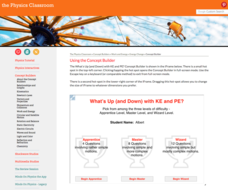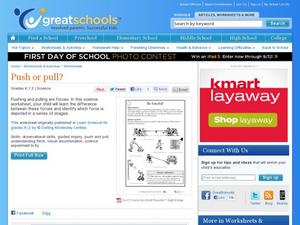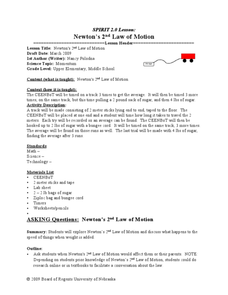Curated OER
Unit VIII: Worksheet 2 - Centripetal Force
Circular motion can make you loopy! On this physics worksheet, learners practice solving problems regarding centripetal force, rotational period, speed, acceleration, and more. A flying aerobat and a couple of amusement park rides make...
Concord Consortium
Double Pendulum
What's better than a pendulum for studying motion and periods? A double pendulum! Young physical scientists use an interactive to explore pendulum motion—times two. The resource boasts a host of parameters to change and a running graph...
CK-12 Foundation
Pan Flute
How can a pan flute sound one note while we hear a chord? The simulation explores sound waves, vibrations, and harmonics at the molecular level. Scholars control the pipe into which air is being blown, the length of the pipe, and which...
CK-12 Foundation
Unicycle
What is the steepness of a hill before a unicyclist slides down it rather than pedaling down it? The simulation graphs the wheel speed versus the unicycle speed as the rider goes down a hill. Scholars control the mass of the rider,...
Oregon State
World Map of Plate Boundaries
Young geologists piece together the puzzle of plate tectonics in an earth science lesson. Given a physical map of the world, they search for land formations that indicate the location of different types of plate boundaries.
Bowels Physics
Newton's Second Law
Were it not for Sir Newton, our understanding of physics and matters of the world would be drastically different. Present your class with detailed information of Newton's Second Law as they explore the concepts of mass and acceleration....
Physics Classroom
What's Up (and Down) with KE and PE
Physics class has its ups and downs ... especially when it involves energy concepts! Scholars analyze information to determine changes in kinetic and potential energy using an interactive resource. Realistic scenarios make connecting...
Curated OER
Crash Test Dummies
Fifth graders are introduced to Newton's First Law of Motion. In groups, they describe the differences between balanced and unbalanced forces. They participate in experiments that demonstrate how equal and opposite forces act upon...
Curated OER
Putting the Ice in Hockey
Eighth grade physical science classes examine why the ice on which hockey is played is slippery. They do so by discussing phases of matter and the molecular motion in each. They read an article on a website and write out answers to 10...
Curated OER
Be forceful!
Didn't some scientist develop rules about force and motion? Youngsters can experience physical science as they determine which picture shows the force of pushing or pulling. Tip: Ask learners if they can think of any unseen forces that...
Acoustical Society of America
Anatomy of a Wave
Pair physical science learners up, and have one describe a transverse wave while the other blindly attempts to draw it. Then reveal an actual diagram and explain the different parts of the wave: crest, trough, wavelength. Though most of...
Curated OER
"Measurement in Motion"
Ninth graders examine the rate of motion and changes in motion using a ramp and a rolling object. They conduct the demonstration, determine the average speed, and describe how a moving object can have zero acceleration and deceleration.
Curated OER
Speedy Trials
Fifth graders investigate how forces affect the motion of an object. In this physics lesson, 5th graders calculate an object's speed using a mathematical formula. They discuss how force and mass affects the speed.
Curated OER
Trajectory and Range of a Projectile
Students investigate the factors affecting projectile trajectory. In this physics lesson, students calculate the range, time and speed of projectiles using mathematical equations.
Curated OER
Junkyard Wars: Wild Watercraft
Students develop a fast travelling hull for a boat. In this physical science lesson plan, the students' hulls will be tested in a channel (built by the teacher) with a fan as the driving force. The students will compete for who has the...
Curated OER
Newton's 2nd Law of Motion
Students investigate how mass affects the speed of an object. In this physics lesson, students record data on the data table and graph results. They analyze findings and formulate a conclusion.
Curated OER
Graphing Your Motion
Seventh graders investigate velocity and speed. In this Vernier Probe instructional activity, 7th graders will use probes to calculate motion, speed, and velocity of an object. They will create a graph of their collected data.
Curated OER
Exploring Motion
Sixth graders study a wind up toy and marble set-up. In this physics lesson, 6th graders work through the steps of the scientific method as they make observations about motion and inertia.
Curated OER
Measuring & Graphing Motion
Fifth graders study how to measure distance. In this graphing motion lesson students complete a lab activity that shows them on the computer how to make graphs.
Curated OER
Investigating Motion
Young scholars explore types of motion. In this motion experiment, students observe how objects move. Young scholars work in small groups to discover the laws of motion.
Curated OER
Motion Near Earth
In this motion worksheet, students will match 5 physics vocabulary words relating to motion with their definitions. Then, they will review 9 statements of different motion scenarios to determine is the statement is true or false....
Curated OER
2nd Grade Physical Sciences
Second graders complete activities to measure motion and learn about the Earth's history. In this motion and Earth history lesson, 2nd graders discuss sound and complete a matching sound activity. Students then study the history of Earth...
Curated OER
Pooper Scooper
Science Students build a pooper scooper tool that helps them clean up after a dog without getting their hands dirty or their noses too close. They research the diseases that can be transported through animal waste and work in teams to...
Mathematics Vision Project
Quadratic Equations
Through a variety of physical and theoretical situations, learners are led through the development of some of the deepest concepts in high school mathematics. Complex numbers, the fundamental theorem of algebra and rational exponents...

























